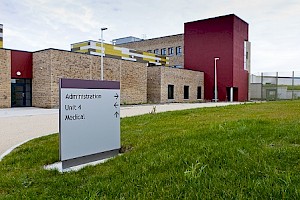Youth Justice
Ireland has a long history of poor responses to offending behaviour by children. A core strand to IPRT's work since its establishment in 1994 has been the promotion of a more effective youth justice system, with emphasis on non-custodial alternatives, diversion, early intervention and prevention strategies and programmes. Central to our work was ending the practice of detaining children in adult prisons, which was in breach of international human rights standards and a serious stain on Ireland's human rights record.
International human rights standards, and in particular the provisions of the UN Convention on the Rights of the Child, are clear that custody for children should only be used as a last resort and for the minimum required period of time. All efforts should be made to apply alternatives to detention to ensure that such a measure is only used in exceptional circumstances.
In Ireland, the Children Act 2001 recognizes the principle of detention as a last resort. The Act prohibits the imprisonment of children and the Criminal Justice Act 2006 makes provision for all children less than 18 years of age to be detained in Children Detention Schools. The detention school model is focused on a model of care, education, health and programmes that address offending, with improved outcomes for the young people, their communities and all of society. The Irish Youth Justice Service is responsible for the Children Detention Schools, within the Department of Children and Youth Affairs.
Following years of sustained advocacy by IPRT, along with many national and international bodies, in 2012 the detention of boys aged under 17 at St Patrick's Institution ended. In March 2017, a Ministerial Order ended the sentencing of children aged under 18 to adult prison in Ireland, and in April 2017, St. Patrick’s Institution was finally closed. Since September 2017 boys aged under 18 are no longer detained in the adult prison system.
IPRT continues to work towards progressive change in youth justice policies and practice, as well as engaging with wider policy and practice issues relating to youth justice, such as the provision of alternatives to detention, diversion and early intervention programmes.

IPRT publishes report on children with care experience in criminal justice system
26th February 2019
ADVISORY: IPRT has published a report, calling for more inter-agency collaboration, sustained policy attention, and the systematic collection of data to tackle the issue of children and young people in care coming into contact with the criminal justice system.
UK: Standards for Children in The Youth Justice System
25th February 2019
Standards for Children in The Youth Justice System was published by the Youth Justice Board and the Ministry of Justice in February 2019.
Systemic issues in Garda response to children deemed “unsuitable” for diversion must be addressed
17th January 2019
ADVISORY: IPRT is deeply concerned at the statistics published today (Thursday, 17th January 2019) that reveal a systemic failure by An Garda Síochána to follow up on thousands of cases where children were deemed “unsuitable” for the Garda Youth Diversion Programme.
RTÉ: Decision to withhold publication of a key review of operations at Oberstown
11th November 2018
RTÉ Radio One ‘This Week’ report on the decision to withhold publication an Operational Review of Oberstown Detention Campus conducted in 2016/17.
UK: User Voice releases 'Nitty Drugs & Broken Trust'
6th November 2018
User Voice releases report on the use of New or Novel psychoactive Substances (NPS) among children and young people in secure estates in England.
Irish Examiner: Improvements at youth detention facility welcomed but ‘more effort needed’
11th October 2018
Noel Baker reports on the publication of the HIQA unannounced inspection report on Oberstown Children Detention Campus.
Significant improvements on Oberstown Campus welcome but inadequate monitoring of ‘restrictive practices’ on children must be addressed – IPRT
10th October 2018
ADVISORY: The Irish Penal Reform Trust (IPRT) welcome improvements in the care provided to children at Oberstown Children Detention Campus, however, IPRT is concerned at inadequate monitoring of the use of physical interventions and restraints.
Publication of Oberstown Annual Report 2016/2017
27th September 2018
Oberstown Children Detention Campus has published its Annual Report for 2016/2017.

UK: Sentencing Young Adults
20th September 2018
The Howard League for Penal Reform has published research on the need for the development of formal sentencing principles for young adults.
Oberstown: Review Implementation Group reports
28th June 2018
The Minister for Children and Youth Affairs has published the Interim and Final Reports of the Review Implementation Group of Oberstown Children Detention Campus.




